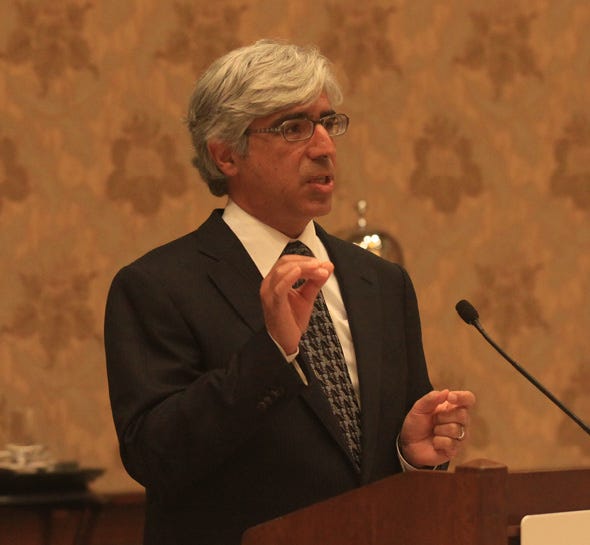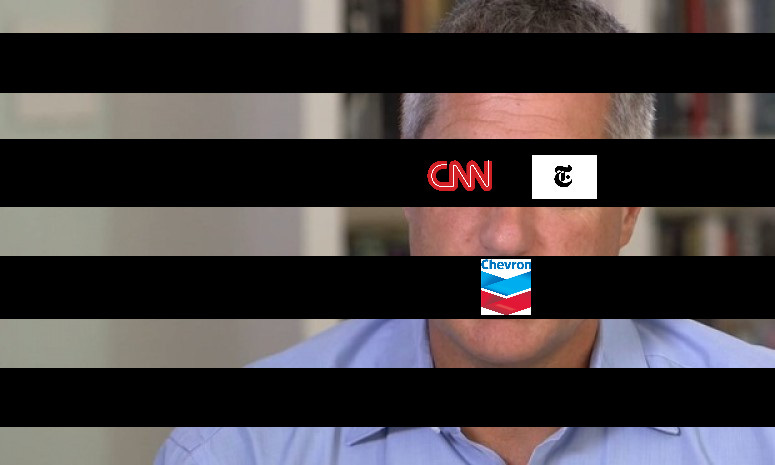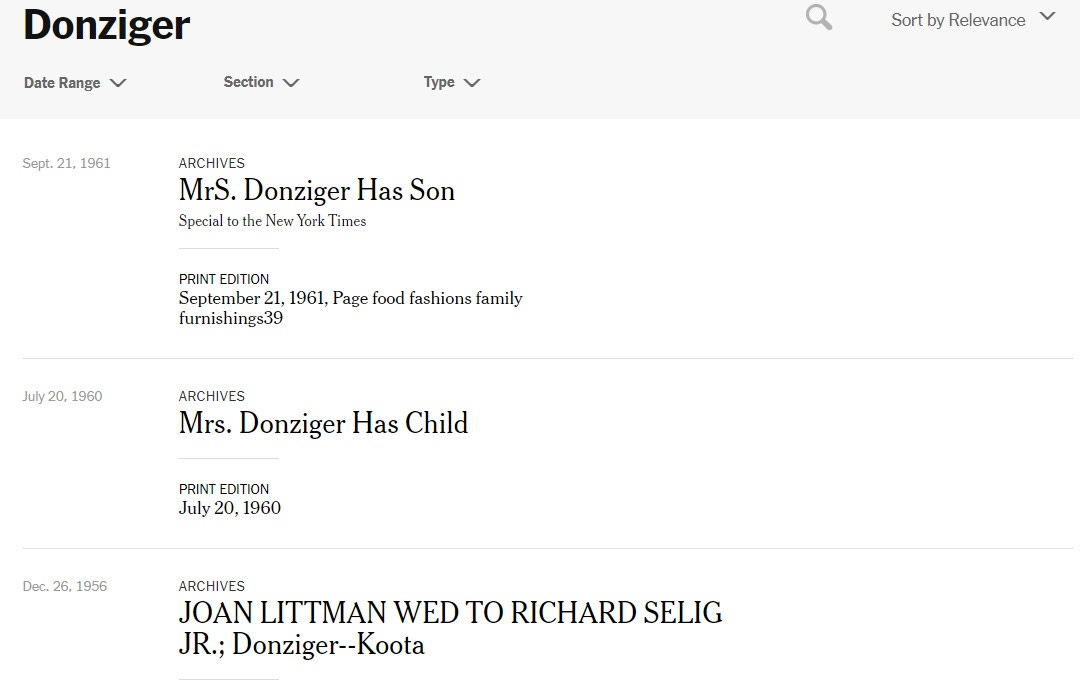Earth Watch August 2: Here's how Chevron has so much influence over mass media, the legal system and politicians
News from the epicenter of the climate justice movement
Mainstream media blackout as judge decides case of corporate political prisoner who successfully sued Chevron
In 1993, Steven Donziger won a landmark lawsuit against oil giant Chevron in Ecuador over the company’s alleged role in the pollution of the Amazon Rainforest and poisoning of Indigenous people. Chevron retaliated, and Donziger has spent more than 720 days under house arrest. He was recently found guilty of criminal contempt of court by a U.S. judge after a private law firm connected to Chevron took over the prosecution of the case. But you won’t hear a thing about this story on U.S. mainstream media. Why not?
Here’s a little experiment. If you can, search ‘Donziger’ on whichever mainstream media news site, or just google it. Here’s what I got from CNN and the New York Times
The New York Times result features the announcement of Steven Donziger’s birth in 1961. Upon further scrolling, I saw that the last time NYT wrote about Mr. Donziger was in 2013 with several articles, one in particular, implies he is “slightly crazy,” and outlines Chevron’s case that Donziger allegedly bribed judges, acted as a ghostwriter on reports that became key evidence and generally, “created this fiction of massive environmental contamination,” according to Chevron. Having never accepted the original judgment, Chevron then took legal action against Donziger.
Steven Donziger’s legal battles with Chevron began with a class action lawsuit in Ecuador where he represented Indigenous tribes whose land and water had been poisoned by oil drilling and pipeline operations at the Lago Agrio oil field, and to this day, pollution remains in the ecologically diverse Amazon Rainforest. At the time, the oil operation was run by Petro-Ecuador, a nationalized oil company, and Texaco, which was sold to Chevron in 2001 while litigation was ongoing. Ecuador initially ordered Chevron to pay an $18 million settlement, which was cut in half by Ecuador’s supreme court, but the verdict was reaffirmed.
Chevron went to the U.S. and then the international courts in order to make its case that Donziger organized massive fraud to secure a judgement against Chevron. The International Court of Arbitration in the Hague eventually ruled in favor of Chevron in 2018, and meanwhile, the company had sent its legal machine after Donziger, starting the latest legal battle back in 2013.
In the process, U.S. District Judge Lewis Kaplan, a former tobacco industry lawyer who owned Chevron stock at the time of the ruling, ordered Donziger to turn over his cellphone and computer to Chevron, which Donziger argues is unconstitutional and a violation of the attorney-client privilege. He appealed the judge’s ruling and refused to turn over his electronics, so the judge responded by charging him with criminal contempt of court, a federal misdemeanor charge.
Kaplan then hand-picked U.S. District Judge Loretta Preska, and she sent criminal contempt of court charge to the relevant public prosecutor in the U.S. Southern District of New York. The prosecutor, however, declined to bring the charges to court, so the judge was allowed to appoint a private law firm, Seward and Kissel, to prosecute the case. Though unusual, this practice is not unheard of, but what is unprecedented in this case, is that Seward and Kissel also has an ongoing financial relationship with Chevron. Now, taxpayer money is going to a private law firm in what is essentially a corporate prosecution of a human rights lawyer, keeping him shackled at his home for more than two years awaiting trial for a misdemeanor charge which normally would not even result in jail time upon conviction.
“The decision marks a sad day for the rule of law, for our democracy, and for our planet,” Donziger said in a statement after he was found guilty. Regardless of possible mistakes made in the 1993 lawsuit, it is true that no one else in history has ever been held for years in house arrest for a misdemeanor while being prosecuted by corporate lawyers with ties to a multinational oil and gas company.

Media bias?
To many, the situation is simply outrageous, and Donziger has received an outcrying of support. Myriad human rights and environmental groups, many well-known celebrities and 68 Nobel Laureates have called for Steven Donziger to be released. Several U.S. Congresspeople have also spoken up about the issue. With so much drama, spanning decades and continents, it seems like the exact type of story that a journalist at the New York Times would want to cover through every twist and turn.
Donziger recently weighed in on why he thinks that the New York Times has not covered his house arrest, saying that NYT uses the same lawyer as Chevron, one Theodore Boutrous Jr.
"One explanation I have as to why the New York Times is ignoring this critically important story of this corporate attack on a human rights lawyer is that its main outside lawyer is the lawyer who's being paid by Chevron to attack me, and the New York Times needs to come clean," Donziger told The Hill on their popular YouTube show, Rising.
The New York Times, however, has additional potential conflicts of interest. First, there’s Robert Denham, who sits on the board of directors for both Chevron and NYT. Second, there is the fact that Chevron has often advertised in the Times. Then there is the NYT lawyer Ted Boutrous, who Donziger called out by name to The Hill, and his history of also representing Chevron.
In 2007, the LA Times called Boutrous a “hired gun of the highest caliber.” Indeed, he has represented major automakers that wanted to avoid vehicle emissions standards in California, multiple oil and gas companies that needed defense against pollution claims, as well as retail giant WalMart and major media companies. He is also a prominent member of the Federalist Society, to which Chevron is a major corporate donor.

The mainstream media blackout of Steven Doniger’s house arrest is a case study of why certain stories get covered versus others, and the far-reaching influence of the fossil fuel industry. To be clear, there is no smoking gun evidence that the NYT or any other media organization has ignored the story because of their relationship with Chevron, but the relationship clearly exists, and Branch Out is hardly the first to question if it impacts news coverage.
A study by Media Matters examined coverage following May 26, 2021, which was considered a bad day for big polluters. A court had ordered Shell to reduce its emissions by 45%, and at the same time, Chevron’s shareholders had also voted to mandate the company slash its emissions. The study found that CNN ran two segments on the news which aired in the middle of the night. During their primetime shows running that week, however, CNN ran 50 ads from Chevron that were meant to greenwash the company, making it seem as if Chevron is doing its best to fight climate change.
The media bias favors Chevron every step of the way. The case of Steven Donziger has been widely covered by independent media, but for some reason represents a red line for many mainstream media outlets. Chevron also holds influence in the legal system itself, with deep pockets to hire the world’s best attorneys and donate to influential organizations such as the Federalist Society. The result is likely not an overt mandate for editors to blackball Donziger, but rather an avoidance based on fear, because Chevron has used Donziger as an example to show the world how powerful it has become.
At Branch Out, we have no advertisers, no corporate connections, and we are forthright about our bias: we believe climate change is an existential threat and that journalism has a role to not only give people the facts, but also to hold corporations and individuals accountable. We are funded 100% by our readers, and in addition to journalism, we help fund grassroots resiliency and carbon farming projects. Please support us, so we can continue doing this important work.
https://branchoutnow.org/
Become a Patron of Branch Out: https://www.patreon.com/branchoutnow/
Make a one-time donation through GoFundMe: https://www.gofundme.com/f/branch-out-fight-for-climate-justice
Poor People’s Campaign marches 27 miles in Texas to demand voting rights, democracy reform
A three-day march from Georgetown to Austin, TX culminated in a rally attended by several thousand people at the Texas state capital Saturday to call upon politicians across the country to pass voting rights legislation, a $15 minimum wage and end the filibuster. The march was organized by The Poor People’s Campaign to bring a “moral revival” to the United States, and was attended by Luci Banes Johnson, daughter of former President Lyndon Johnson, former Senate and Presidential candidate Beto O’Rourke, rockstar Willie Nelson, among many leaders of the Poor People’s Campaign including Co-Chair Rev. Dr. William J. Barber II.
After marching 27 miles over the preceding days, Rev. Barber began the rally with a rousing speech against laws passed in 18 states that Barber says are “voter suppression measures,” aimed at making voting more difficult for poor people and many people of color. In his speech, Barber called on the President and Democrats in Congress to take action now.
One specific law that Barber and other speakers at the event endorsed is H.R. 1, the For the People Act, which is a broad democracy reform bill that would make voting an easier process and cracking down on unregulated corporate donations to political campaigns. Many environmental organizations have gotten behind H.R. 1 in order to make it harder for big polluters to give money to politicians. Chevron, for example, spent at least $8.5 million that we know of on political candidates’ campaigns over the 2020 election cycle.
Environmental groups have also thrown their support behind H.R. 1. In January, Greenpeace USA Democracy Campaign Director Folabi Olagbaju released a statement that said, “he reforms in the For the People Act will be a major step in fixing what is broken in our democracy, by getting polluters’ money out of politics, restoring voting rights and offering new protections for voters, end gerrymandering so that electoral districts are fairly drawn, and returning power to the people. As a result, we will see a domino effect, with rapid progress on the issues we care about most, climate solutions that protect the environment and expanding affordable healthcare, to passing fair labor laws and creating millions of good-paying jobs.”
Support Regenerative & Renewable Transitional Housing & Climate Justice!
For the last month Branch Out has worked on the ground in Christmas Valley, Oregon with Commune 222 on a variety of permaculture, climate relief, & carbon sequestration projects, some of which we have described in our recently published article Christmas Valley in July and previous newsletters.
Now, as people across the nation face a looming eviction crisis, our joint efforts are increasingly focused on expanding our partner’s capacity to provide transitional housing for families facing economic displacement.
In just the last week, two new families have indicated their need to move into transitional housing on the land stewarded by Commune 222 in partnership with Branch Out, and we are urgently requesting additional funds to support their move and new residences.
Donations to Branch Out will go directly towards supporting Commune 222’s transitional housing at this critical time. The more funds we receive, the more we can do to not only help provide housing but also directly increase its environmental benefits such as through donations of biochar stoves and solar panels. These simple solutions meet critical household needs while providing tangible climate benefits.
Please contribute today to our Patreon and/or GoFundMe to make an immediate impact at this crucial intersection of the housing and climate crises!








